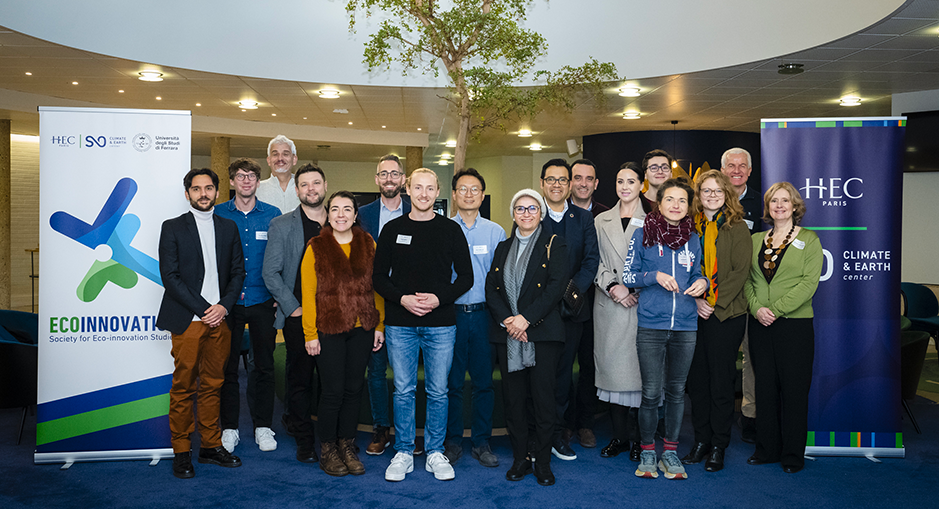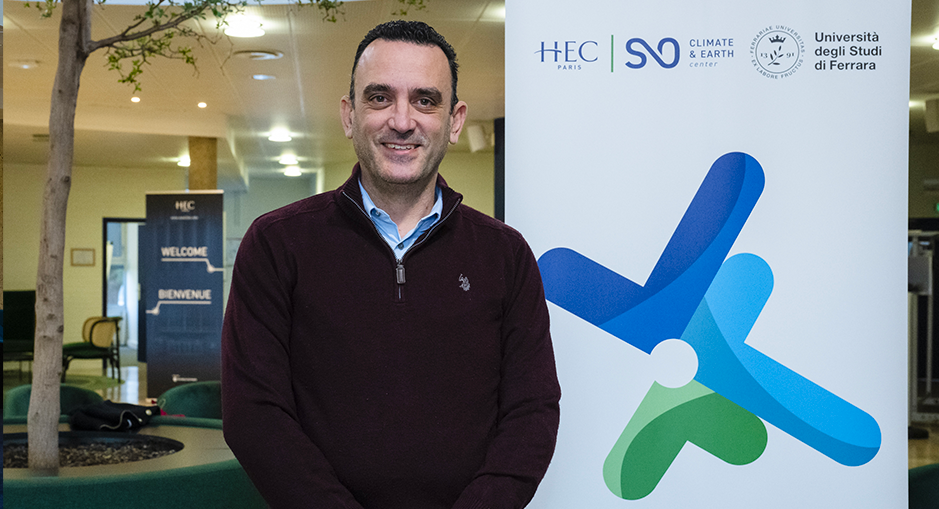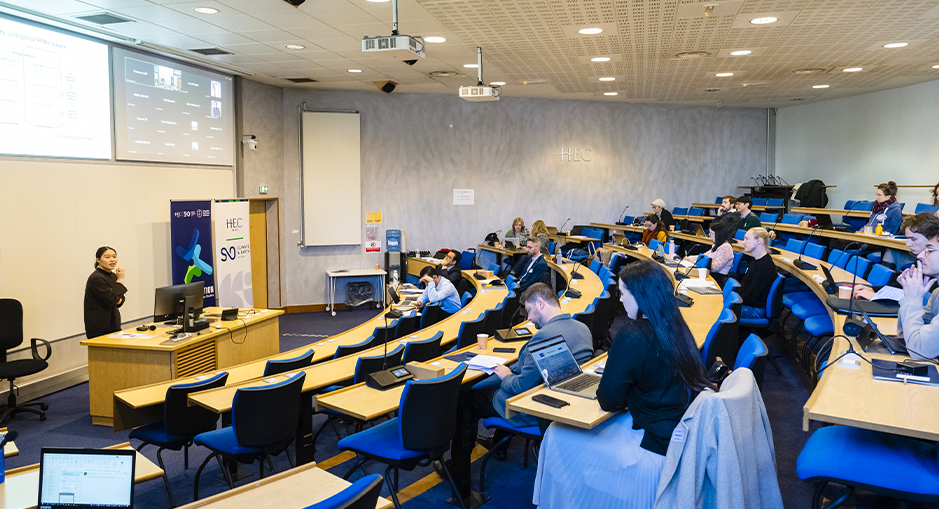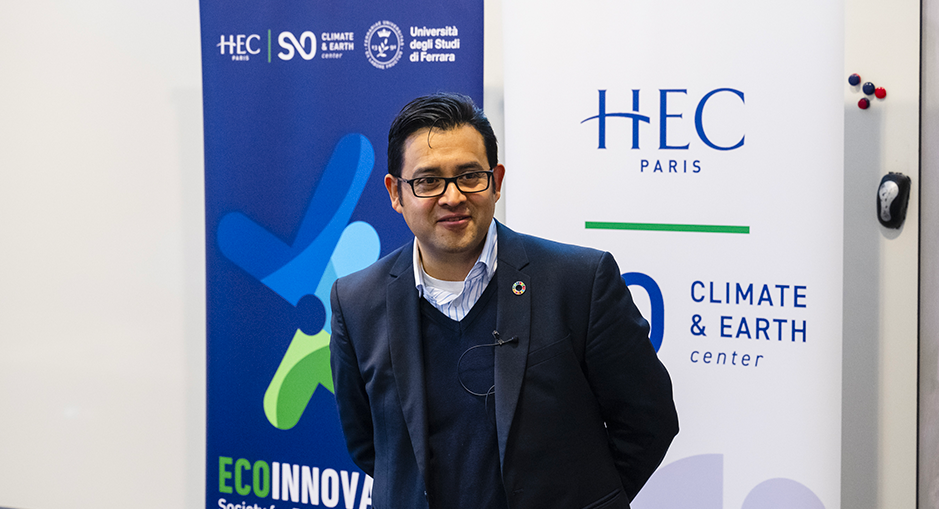Eco-Innovation Society 2024: A Global Conclave for Greener Futures
The second biennial workshop of the Society for Eco-Innovation Studies hosted by HEC Paris was a timely reminder of the transformative power of collaboration and interdisciplinary research around eco-innovation. Over two days, global experts from academia, policy, and industry gathered to share insights, challenge assumptions, and chart new paths forward.

Eco-innovation has emerged as a critical field at the nexus of technology, sustainability, and economic transformation. In this relatively new domain, academic research delves into how green technologies, policy frameworks, and business strategies can promote environmental sustainability without hindering economic growth. This interdisciplinary field integrates insights from economics, environmental science, and management, examining areas such as technology and open innovation, circular and socially fair economy, decarbonization, climate resilience, competitiveness effects, and the role of public-private partnerships. Indeed, recent research emphasizes the significance of collaborations between public and private sectors, stakeholder co-creation, and the application of digital technologies like artificial intelligence to expedite eco-innovation. This convergence highlights a shared understanding: addressing the climate crisis necessitates not just isolated solutions but systemic change.
The second biennial workshop of the Eco-Innovation Society, held at HEC Paris on November 28-29, 2024, brought these research themes to life. Over two days, experts from academia, policy, and industry shared insights, challenged assumptions, and charted new paths forward. Hosted by HEC Paris’s Sustainability & Organizations (S&O) Climate and Earth Center, the workshop was as much a celebration of progress as it was a reckoning with the immense challenges ahead. "We are not just solving problems; we are rethinking systems," declared HEC executive director of its Climate and Earth Center Fernando J. Díaz López. “To help achieve this we have invited our HEC students to join us throughout the day, to represent the next generation of decision-makers directly facing the sustainability and innovation challenges we will be discussing these two days,” said the event’s co-organizer and a leading voice in eco-innovation. In the opening session of the workshop, Diàz López mapped out the objectives the Society he helped found has been setting itself: “Our Eco-innovation Society brings together a relatively new group of scholars and practitioners, all interested in mainstream research and innovation. Two years ago, we organized our first workshop in Ferrara, Italy, and the ambitions remain the same: to try summarizing areas in which such research has achieved consensus along with the main lessons learned and to understand which research directions are currently still open and worth being investigated.”
From Cyprus to South Africa: Keynotes That Inspired
This second workshop showcased groundbreaking research ranging from green employment to firsthand accounts of regional innovation strategies. It revealed the immense potential - and the urgency - of eco-innovation. As participants emphasized repeatedly, this isn’t merely about new technologies but about fostering a global movement that reimagines sustainability.
Two keynote addresses framed the workshop’s central themes: localized innovation and the transformative role of crises in driving systemic change. Alexandros Charalambides of the Cyprus University of Technology delivered a deeply personal presentation on transforming Cyprus into a hub for cleantech. Drawing on the island’s unique geographic and economic conditions, Charalambides outlined a roadmap that includes initiatives such as carbon capture, renewable energy integration, and sustainable urban planning. "Cyprus, as an island nation, offers both constraints and opportunities," Charalambides remarked during a conference break. "Our small size allows us to act as a laboratory for innovation, testing concepts that might be more challenging to implement on a larger scale." He highlighted specific projects, including the development of smart ecological storage zones and the introduction of hydrogen energy systems. "We’ve partnered with international teams to benchmark technologies and adapt them to our conditions," he continued. However, the Mechanical Engineering graduate also acknowledged systemic hurdles, such as limited industrial engagement and underfunded public initiatives. "Innovation doesn’t happen in isolation. It requires a network of engaged actors - governments, academia, and industry - pushing in the same direction. Without that, progress is piecemeal."
Charalambides’s vision extended beyond technology to policy and culture. He shared his dream of making Cyprus a hub for cleantech innovation in the Mediterranean. "We’re not just building systems; we’re building trust and cooperation," he said. His closing words struck a chord: "Cyprus may be small, but its potential to influence regional sustainability is enormous. We have the ability - and the responsibility - to lead."

In contrast, Imke de Kock, Associate Professor at Stellenbosch University, focused on the role of crises in catalyzing sustainability transitions. Before her keynote speech, delivered with characteristic candor, she examined South Africa’s turbulent journey toward sustainability, particularly during the energy shortages of the 2010s. "In South Africa, crises are often the only thing that shakes the system into action," de Kock observed in an informal interview with HEC. "Our energy crisis was a wake-up call that forced us to rethink not just infrastructure but the very way we approach energy policy."
De Kock detailed the innovations that emerged from these crises, including the rise of renewable energy projects and improved grid management. However, she cautioned against relying solely on crises to drive change. "Crisis-driven innovation is often reactive. It addresses immediate problems but rarely builds the long-term resilience needed to prevent future crises. True progress lies in embedding resilience into our systems before crises strike."
Her keynote included vivid examples of how grassroots initiatives in South Africa have filled gaps left by government inaction. "Communities have taken it upon themselves to innovate, creating micro-grids and local renewable energy solutions," she said. "These are inspiring, but they highlight the systemic failure to provide equitable and sustainable infrastructure."
De Kock concluded with a call to action, emphasizing the need for proactive, strategic thinking. "If we wait for the next crisis to act, we’ll always be playing catch-up. The challenge is to create systems that anticipate and adapt before the tipping points arrive. That’s the difference between surviving and thriving."
Diverse Voices, Unified Purpose
The richness of the workshop lay not just in its high-profile speakers but in the diversity of perspectives. Souad Boungab, a professor at Morocco’s École Nationale de Commerce et de Gestion in Tangier, brought a North African perspective to the dialogue. Boungab described her collaborative research with Spanish colleagues on the drivers of eco-innovation, emphasizing the intersection of ecological and economic imperatives. "Too often, eco-innovation is framed solely as an environmental issue," she noted. "But it’s equally about economic transformation. The two must go hand in hand."
Boungab’s work has focused on the automotive sector, a cornerstone of Morocco’s economy. Her research highlights the sector’s gradual adoption of renewable energy and waste-reduction practices. "In Morocco, the automotive industry is not just a sector; it’s a locomotive for broader change," she explained. Despite the high upfront costs of eco-innovation, Boungab stressed its long-term economic benefits, noting that initial resistance often gives way to enthusiasm once firms witness measurable gains in efficiency and competitiveness.
Research on Multi-stakeholder Collaboration
The workshop’s paper sessions showcased the depth and breadth of contemporary eco-innovation research. Topics ranged from public financial support for green technologies to the role of circular business models in transitioning industries. One particularly compelling session featured Alison Hsu, a PhD candidate in her fifth year at HEC Paris. Her longitudinal study on direct air capture (DAC) technology explored how multi-stakeholder collaboration fosters industrial evolution. "Grand challenges like climate change require not just technological solutions but also new forms of governance and partnership," Hsu argued. Her focus on DAC coincides with the IPCC’s call for experts for its upcoming Scoping Meeting for Methodology Report on Carbon Dioxide Removal Technologies. It has put the issue firmly near the top of its science policy agenda for the coming years and Hsu’s research could well be included in the report.

Another standout presentation came from Pablo del Rio of the Spanish National Research Council. His econometric analysis of Spanish firms revealed that cleaner production methods - unlike end-of-pipe technologies - are far more likely to generate green jobs in the long term. "Eco-innovation isn’t just about sustainability; it’s about rethinking labor markets and skill development," he said he told the audience of 40 scholars.
Lessons from the Field
The workshop was not only an intellectual exercise but also a platform for sharing practical insights. Boungab’s reflections underscored the importance of regional context. Morocco, she noted, has made significant strides in renewable energy, with ambitious projects in wind and solar power. "But the transition must go beyond energy to include waste management, water conservation, and urban planning," she argued. Her ongoing research aims to map out how Moroccan firms can leverage eco-innovation not just for compliance but as a competitive advantage. Charalambides revisited Cyprus’s experience as a testing ground for cleantech innovations, such as smart ecological storage zones. Despite resource constraints, Cyprus has demonstrated the power of small-scale, targeted interventions. Yet, as Charalambides admitted, systemic issues like limited industrial engagement and underfunded public initiatives remain barriers.
A recurring theme throughout the workshop was the need to bridge the gap between academic research and real-world applications. Artemisa Aguirre Gomez, a sustainability consultant from Mexico, observed how many challenges faced by small firms in southern Europe mirrored those in Latin America. "The barriers - lack of funding, resistance to change, inadequate policies—are universal," she said. Yet, Aguirre Gomez also highlighted the workshop’s most inspiring aspect: its emphasis on solutions. "What struck me is the optimism. The case studies presented here show what’s possible when firms, governments, and researchers work together."
For some participants, the workshop was an opportunity to explore emerging methodologies. Boungab, for instance, was particularly intrigued by presentations on the use of artificial intelligence and big data in eco-innovation research. "These tools could revolutionize how we approach sustainability," she said. While she has yet to incorporate AI into her work, the veteran academic from ENCG Tanger expressed eagerness to explore its potential applications in analyzing eco-innovation trends in Morocco.
Pragmatic Success Stories from the Global Community
Eco-innovation has already shown tangible results in bridging environmental sustainability and economic growth. One notable example is the Scandinavian leadership in circular economies. Denmark has implemented a nationwide waste-to-energy program, turning over 30% of municipal waste into heat and electricity. This initiative, supported by strong public-private collaboration, has reduced landfill dependency and provided renewable energy to millions of homes.
Another success story comes from France, where Schneider’s Electric Green Hydrogen Solutions has been launched to drive safe and sustainable green hydrogen operations. The company has been named the world’s most sustainable company by Time magazine for its ongoing work to reduce its customers carbon emissions and increase its energy efficiency. Meanwhile, companies like Finline Furniture have embraced the circular economy by refurbishing old furniture into new products, appealing to eco-conscious consumers and reducing waste. Similarly, start-ups such as Well Spent Grain repurpose brewers' spent grains into nutritious snacks, exemplifying innovative approaches to sustainability in business.
These instances demonstrate how eco-innovation is being effectively applied across politics, sustainability, and business, fostering a more sustainable and resilient future. They also show how eco-innovation can align business priorities with sustainable practices, creating competitive advantages while addressing climate challenges.

The Future of Eco-Innovation
As the workshop drew to a close, participants reflected on the road ahead. A closing session led by Fernando Díaz López and Massimiliano Mazzanti of the University of Ferrara, partners in the workshop, identified several priorities, including the need for stronger public-private partnerships, enhanced educational outreach, and the development of policy toolkits. The session also emphasized the importance of inclusivity, particularly in bringing voices from the Global South into the conversation.
"Eco-innovation is no longer a niche," said Díaz López in his closing remarks. "It is central to how we reimagine our economies and societies in the face of unprecedented challenges. The question now is not whether we innovate but how boldly we are willing to act."